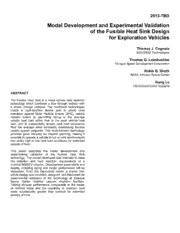
NASA Technical Reports Server (NTRS) 20120016884: Model Development and Experimental Validation of the Fusible Heat Sink Design for Exploration Vehicles PDF
Preview NASA Technical Reports Server (NTRS) 20120016884: Model Development and Experimental Validation of the Fusible Heat Sink Design for Exploration Vehicles
2013-TBD Model Development and Experimental Validation of the Fusible Heat Sink Design for Exploration Vehicles Thomas J. Cognata ESCG/MEI Technologies Thomas O. Leimkuehler Paragon Space Development Corporation Rubik B. Sheth NASA Johnson Space Center Hung Le ESCG/GeoControl Systems ABSTRACT The Fusible Heat Sink is a novel vehicle heat rejection technology which combines a flow through radiator with a phase change material. The combined technologies create a multi-function device able to shield crew members against Solar Particle Events (SPE), reduce radiator extent by permitting sizing to the average vehicle heat load rather than to the peak vehicle heat load, and to substantially absorb heat load excursions from the average while constantly maintaining thermal control system setpoints. This multi-function technology provides great flexibility for mission planning, making it possible to operate a vehicle in hot or cold environments and under high or low heat load conditions for extended periods of time. This paper describes the model development and experimental validation of the Fusible Heat Sink technology. The model developed was intended to meet the radiation and heat rejection requirements of a nominal MMSEV mission. Development parameters and results, including sizing and model performance will be discussed. From this flight-sized model, a scaled test- article design was modeled, designed, and fabricated for experimental validation of the technology at Johnson Space Center thermal vacuum chamber facilities. Testing showed performance comparable to the model at nominal loads and the capability to maintain heat loads substantially greater than nominal for extended periods of time.
